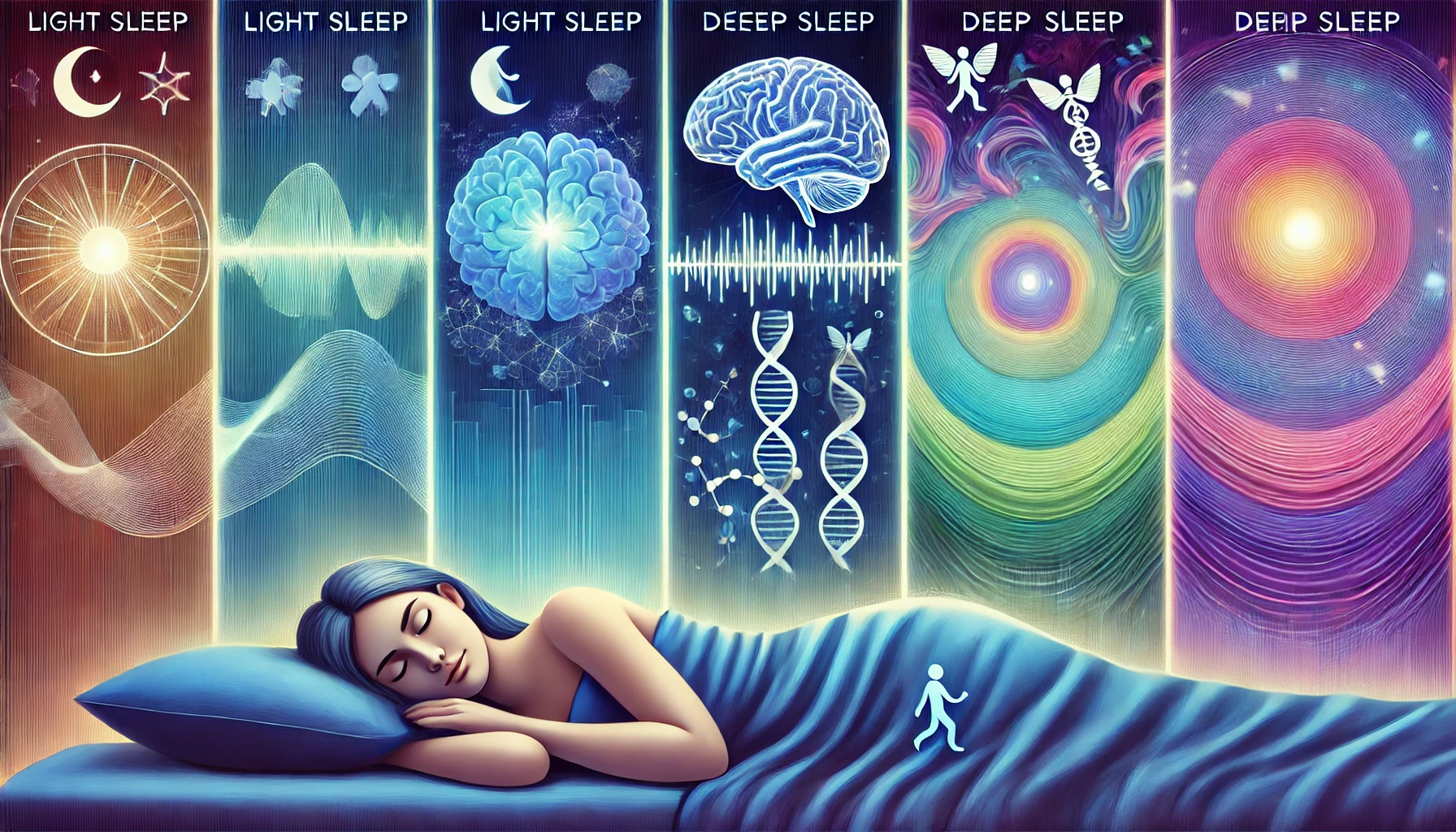The human sleep cycle consists of four distinct stages, each playing a vital role in restoring your body and mind. These stages include three non-REM (NREM) phases and one REM phase, cycling multiple times throughout the night to ensure deep rest, memory consolidation, and emotional regulation. Understanding these stages helps explain why quality sleep is essential for overall health.
Stage 1: Light Sleep (NREM 1)
The first stage of sleep is the transition from wakefulness to sleep. It lasts for about 1-5 minutes and accounts for 5% of total sleep time.
During this phase:
- Brain activity slows down, and alpha waves decrease as theta waves take over.
- You may experience hypnic jerks, sudden muscle twitches that can wake you up.
- External sounds and disturbances can easily interrupt your sleep.
Key Role: This stage prepares your body for deeper sleep.
Stage 2: Deeper Light Sleep (NREM 2)
Stage 2 marks the onset of true sleep. This phase makes up the largest portion of the sleep cycle, about 50% of total sleep time.
In this stage:
- Brain waves slow further, with intermittent bursts of rapid activity called sleep spindles.
- Heart rate, breathing, and body temperature drop, creating an ideal environment for rest.
- The brain begins consolidating memories and processing learned information.
Fun Fact: Sleep spindles may protect the brain from waking up due to external noises.
Stage 3: Deep Sleep (NREM 3)
Also known as slow-wave sleep (SWS), this is the most restorative phase of sleep. It typically lasts 20-40 minutes per cycle and occurs mostly in the first half of the night.
Key characteristics of this stage:
- The brain produces delta waves, the slowest and deepest brain activity.
- The body focuses on repair and growth, releasing growth hormones and boosting the immune system.
- Waking up during this stage can lead to sleep inertia, leaving you groggy and disoriented.
Why It Matters: This stage is crucial for physical healing and consolidating long-term memories.
Stage 4: REM Sleep
Rapid Eye Movement (REM) sleep is the final stage, occurring about 90 minutes after you fall asleep. This phase becomes longer in later cycles, lasting up to an hour.
During REM sleep:
- Brain activity resembles wakefulness, while the body experiences muscle atonia (paralysis).
- Dreaming occurs, fueled by the activation of emotional and memory-related brain regions.
- The body regulates emotional processing and supports cognitive functions like problem-solving and creativity.
Interesting Statistic: REM sleep accounts for 20-25% of total sleep in adults, but infants spend up to 50% of their sleep in REM.
The Importance of Sleep Cycles
A complete sleep cycle lasts about 90-120 minutes, repeating 4-6 times per night. Skipping or disrupting any stage can impair your body’s ability to recover and process information.
- Lack of deep sleep can lead to weakened immunity and poor physical health.
- Reduced REM sleep has been linked to emotional instability and memory issues.
According to the CDC, adults should aim for 7-9 hours of sleep per night to ensure sufficient cycles.
How to Optimize Your Sleep Cycles
- Stick to a Sleep Schedule: Going to bed and waking up at the same time helps regulate your body’s internal clock.
- Create a Sleep-Friendly Environment: Keep your bedroom cool, dark, and quiet to minimize disruptions.
- Avoid Stimulants: Reduce caffeine and screen time before bedtime to promote deeper sleep stages.
- Exercise Regularly: Physical activity can enhance slow-wave sleep but avoid intense workouts close to bedtime.
Conclusion
Understanding the four stages of sleep highlights how your body and brain work together to rejuvenate during the night. Each stage has a unique role in maintaining physical health, emotional stability, and cognitive sharpness.
By prioritizing good sleep hygiene, you can ensure your body completes its cycles, unlocking the full benefits of a restful night. Sleep is not just downtime—it’s essential for living your best life. So tonight, as you lie down, remember: quality sleep is the foundation of a healthy mind and body.
Ethan Numeros is a distinguished dream analysis expert with a background in Mathematics and Philosophy from Stanford University and specialized training in Dream Analysis. With 15 years in academia, he has authored two acclaimed books and numerous articles, focusing primarily on dream interpretation. Mr. Numeros excels in offering personalized consultations, helping individuals unlock the mysteries of their dreams. His expertise in decoding the psychological aspects of dreams has made him a sought-after figure in the field of dream explanation.
